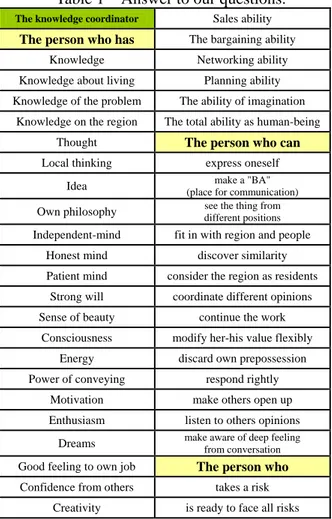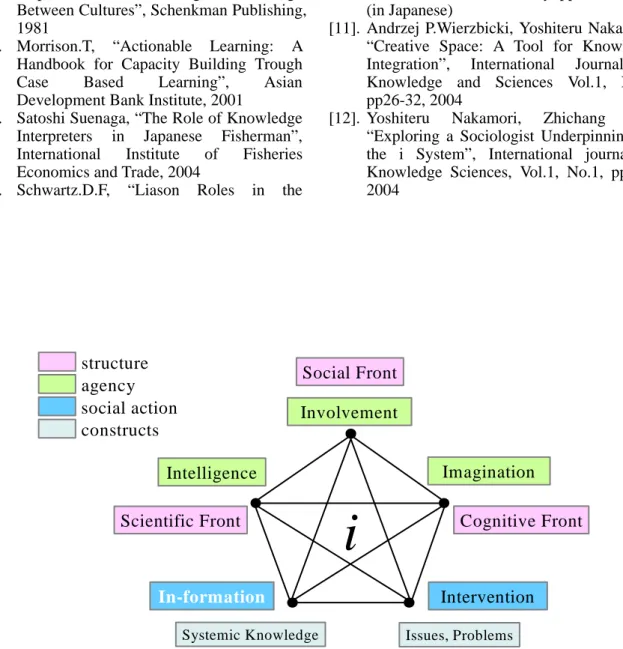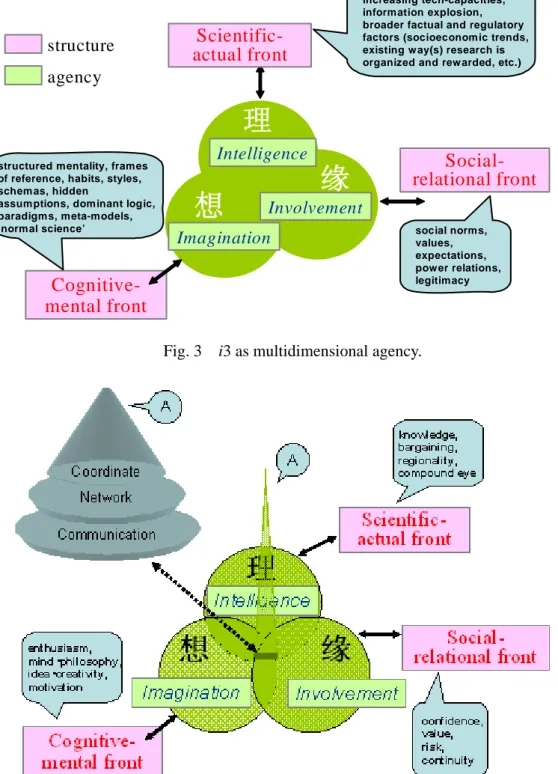Japan Advanced Institute of Science and Technology
JAIST Repository
https://dspace.jaist.ac.jp/
Title Exploring Skills and Qualities of Knowledge Coordinators in Regional Reactivation Projects Author(s) Chihara, Kayano; Nakamori, Yoshiteru
Citation
Issue Date 2007-11
Type Conference Paper
Text version publisher
URL http://hdl.handle.net/10119/4131 Rights
Description
The original publication is available at JAIST Press http://www.jaist.ac.jp/library/jaist-press/index.html, Proceedings of KSS'2007 : The Eighth International Symposium on Knowledge and Systems Sciences : November 5-7, 2007, [Ishikawa High-Tech Conference Center, Nomi, Ishikawa, JAPAN], Organized by: Japan Advanced Institute of Science and Technology
Exploring Skills and Qualities of Knowledge Coordinators
in Regional Reactivation Projects
Kayano Chihara Yoshiteru Nakamori
Graduate School of Knowledge Science
Japan Advanced Institute of Science and Technology
1-1 Asahidai, Nomi, Ishikawa, 923-1292, Japan
{
k-chiha,nakamori
}@jaist.ac.jp
Abstract
The 21st century Center of Excellence (COE) program at Japan Advanced Institute of Science and Technology (JAIST) aims to educate graduate students to be knowledge coordinators through several educational courses. However, the definition of a knowledge coordinator here includes extensive concept. There are still rooms to verify it in several cases. This paper tries to define knowledge coordinators who work in regional reactivation projects: what kind of skills and qualities are required in regional reactivation projects. To fulfill this research, we use a knowledge management methodology called the i-System which was developed in JAIST. This is one of the constructivist models for knowledge management. With the i-System, we will explore the skills and qualities of knowledge coordinators who work in regional reactivation projects.
Keywords: Knowledge coordinator, regional reactivation projects, the i-System
1 Introduction
The concept of knowledge coordinator was proposed and examined through the COE program "Technology Creation Based on Knowledge Science" at JAIST. In the program, the knowledge coordinator is defined as a person who can make innovation in each different field. However, this definition includes extensive concept, so there are still rooms to explore what kind of skills and qualities are required in some specific cases.
In this paper, we investigate knowledge coordinators who work in regional reactivation projects. The purpose of regional reactivation projects is to activate regional industries and economies using the characters and resources of
the region [1]. In other words, regional innovation is required [2] [3]. Thus, in order to integrate separated knowledge and create a new knowledge, it is necessary to promote the cooperation between independent organizations and communities such as regional government, companies, universities, NPO, etc. [4]. Therefore, knowledge coordinators in regional reactivation projects are regarded as persons who coordinate these knowledge creation processes.
In this paper we try to make clear their skills and qualities. First, we describe the concept of the knowledge coordinator which is proposed by the COE program at JAIST. Secondly we explain a concept of regional reactivation projects and necessity of knowledge coordinators. Finally, we consider their specific skills and qualities using the i-System.
2 Knowledge Coordinators Proposed by the COE at JAIST
The COE program “Technology Creation Based on Knowledge Science” which is supported by the Ministry of Education, Culture, Sports, Science and Technology at JAIST, Japan has been running several projects. Through those projects, the COE has been implementing human resource development. One of the main purposes is to educate graduate students to be knowledge coordinators.
Here, the knowledge coordinator is defined as follows: the person who can make innovation in each field by an interdisciplinary knowledge, free-thinking and total skill of judgment, deep insight and systems thinking [5]. It is expected that knowledge coordinators work widely in our society. However, this definition includes extensive concept, so there are still rooms to explore what kind of skills and qualities are required in some specific fields.
3 Requirement of Knowledge Coordinators in Regional Reactivation Projects
To explore more specific skills and qualities of knowledge coordinators in some cases, we put here regional reactivation projects since these projects seem to require knowledge coordinators. Regional reactivation projects are the project supported by the central government and its purpose is to activate regional economy and give more opportunities of employment for local people. Scheme of this project is that regional governments propose “Regional Reactivation Plan” to the central government first based on geographic-natural characteristic and cultural attractiveness of the region. Then the central government approves and supports it. Hence regional governments need to know regional character and its situation to effectively use multi-fields knowledge. It will be an important key to cooperate with others such as regional governments, companies, universities and NPO to lead regional reactivation projects to success (see Fig. 1).
In related with this background, a coordinator is needed for each project. Even though people have the same goal such as reactivating their
region, their position and their-owned knowledge are different. These differences make their communication harder. Therefore, we need a coordinator who can work to bridge these differences of actors [6] [7]. It is known that there are persons who have the similar roles with a knowledge coordinator, such as Knowledge Interpreters [8], Liaison [9], or Bridge [10]. They play the similar roles, but we need a knowledge coordinator who can not only bridge differences but also coordinate knowledge to bring on innovation [11]. We need to verify skills and qualities of knowledge coordinators having such roles in regional reactivation projects.
4 Analysis of the Knowledge Coordinator in Regional Reactivation Projects Using the
i-System
4.1 Keywords for the Knowledge Coordinators It can be thought that there must be a knowledge coordinator in a successful regional reactivation project as a key person who leads it to success. The role of knowledge coordinators in regional reactivation projects might be the same as those
C NPO A A B C Company A B C University Government A B C Their own knowledge Their own knowledge B Their own knowledge Their own knowledge
Cultural attractiveness of region
Geographic-natural characteristic
defined by the COE program at JAIST. Table 1 Answer to our questions. The knowledge coordinator Sales ability
The person who has The bargaining ability
Knowledge Networking ability Knowledge about living Planning ability
Knowledge of the problem The ability of imagination Knowledge on the region The total ability as human-being
Thought The person who can
Local thinking express oneself Idea (place for communication)make a "BA" Own philosophy different positionssee the thing from Independent-mind fit in with region and people
Honest mind discover similarity Patient mind consider the region as residents
Strong will coordinate different opinions Sense of beauty continue the work
Consciousness modify her-his value flexibly Energy discard own prepossession Power of conveying respond rightly
Motivation make others open up Enthusiasm listen to others opinions
Dreams make aware of deep feeling from conversation Good feeling to own job The person who
Confidence from others takes a risk Creativity is ready to face all risks The common roles of both of two are to coordinate knowledge and make innovation in the broad sense. However, it is necessary to redefine it by exploring what kind of skills and qualities knowledge coordinators should have in some specific cases. We limit here the knowledge coordinators who work in regional reactivation projects. We have interviewed twelve experts who have been working in successful projects in Japan. All of them are experts of successful regional reactivation projects and they have familiarity with key persons who lead regional reactivation projects to success.
From these interviews, we got totally forty-four answers to our questions about their skills and qualities. Those all answers are shown in Table 1. It is categorized into three as follows: ・the knowledge coordinator is a person who has
…(keywords in the list),
・the knowledge coordinator is a person who can …,
・the knowledge coordinator is a person who….
Through twelve interviews, experts sometimes chose the same skills and qualities required for knowledge coordinators. For example, all experts picked up knowledge to our question as one of the important elements and motivation is also one of the keywords which were selected by many experts. However, we show the all answers without showing the selected number since it is not our purpose to modify those priorities.
Table 2 Categorized answers. Networking Continuity ・networking ability ・continue the work
Risk Confidence ・takes a risk
・is ready to face all risks
・make others open up ・confidence from others Bargaining Compound eye ・sales ability
・the bargaining ability
・see the thing from different positions ・discover similarity Regionality Value ・consider the region
as residents
・fit in with region and people ・local thinking
・modify her-his value ・flexibly discard own prepossession Motivation Enthusiasm ・motivation
・energy Power of conveying ・consciousness
・enthusiasm ・dreams
・good feeling to own job Communication Knowledge ・respond rightly
・listen to others opinions ・make aware of deep feeling from conversation ・express oneself
・knowledge
・knowledge about living ・knowledge of the problem ・knowledge on the region Mind, Philosophy Idea, Creativity ・thought ・own philosophy ・independent-mind ・honest mind ・patient mind ・strong will ・idea ・sense of beauty ・creativity ・planning ability ・the ability of imagination Coordinate No categorization ・make a "BA"
(place for communication) ・coordinate different opinions
・The total ability as human-being
We categorized these answers into totally fifteen keywords based on the similarities of the meaning of the word.
The answer that the total ability as human-being is categorized exceptional one. Whole category is shown Table 2.
In order to analyze the relationship of all of the categorized answers and redefine knowledge coordinators, we used the i-System [12].
The i-System is a system methodology for knowledge integration and creation. It means the
i-System shows how to integrate knowledge and
create knowledge. In 4.2, we introduce the
i-System.
4.2 The i-System
The i-System is one of the constructivist models for knowledge management. Later, Nakamori and Zhu reconstructed this i-System from sociological view (see Fig. 2) [12]. It is divided three social structures. This i-System shows specific required skills and qualities of actors in each front. Therefore the i-System is optimum model to organize and analyze keywords of knowledge coordinators who need to coordinate knowledge to bring on innovation.
It is considered by three social structures named the scientific-actual front, cognitive-mental front, and social-relational front. In each front, this model requires necessary abilities, skills, and qualities of actors such as Fig.3.
・A scientific-actual front :
established theories, increasing tech-capacities, information explosion, broader factual and regulatory factors (socioeconomic trends, existing way(s) research is organized and rewarded, etc.)
・A cognitive-mental front :
structured mentality, frames of reference, habits, styles, schemas, hidden assumptions, dominant logic, paradigms, meta-models, “normal science”
・A social-relational front :
social norms, values, expectations, power relations, legitimacy
5 Consideration
When we put the keywords of the knowledge coordinator into the i-System based on these theories, we can see interesting matching as follows:
・ A scientific-actual front:
knowledge, bargaining, regionality, compound eye
・ A cognitive-mental front:
enthusiasm, mind, philosophy, idea, creativity, motivation
・ A social-relational front:
confidence, value, risk, continuity
We put communication, network and coordinate skills in the center of overlapped
three fronts. Because these skills can not put into one front, it seems the total abilities which are related to all of three deeply (see Fig. 4).
As a result of this analysis, we can say that the knowledge coordinator is well-balanced person. Because when we tried to put all fifteen keywords of the knowledge coordinator into the
i-System, we could divide into each front with
well-balanced. Thus, the knowledge coordinator is a person who has four skills and qualities in each of three fronts. In addition these, communication, network and coordinate skills are necessary as total skills for knowledge coordinators in regional reactivation projects. 6 Conclusion
In this paper we made clear the skills and qualities of a knowledge coordinator. First, we described the concept of the knowledge coordinator which is proposed by the COE program at JAIST. Secondly we explained a concept of regional reactivation projects and necessity of knowledge coordinators. Finally, we consider their specific skills and qualities using the i-System. It is necessary to verify the process how people learn those skills and qualities to be a knowledge coordinator. Therefore we will carry out the questionnaire survey in addition to the interview through the successful cases in regional reactivation projects.
References
[1]. Central Office for Regional reactivation
project, 2007 http://www.kantei.go.jp/jp/singi/tiikisaisei/
[2]. Jinno Naohiko, “Economic of Regional
Reactivation: Redefine Wealth”,
Chuukou-Shinsyo, 2003 (in Japanese) [3]. Nader Fergany, “Social Innovation for
Human Development an Arab Regional Perspective”, FRIDE, 2003. http://www.fride.org/home/HOME.aspx
[4]. Takashi Tatsuse, “The Capability and the Problem for the Coordinator in Regional University-Industry Relation”, Strategic Use and Problem of the University-Industry Coordinator, COE center of Japan Advanced Institute of Science and Technology, pp2-12, 2005 (in Japanese) [5]. Tomoko Kikuchi, Yoshiteru Nakamori,
A.P.Wierzbicki, “Article of BA for Knowledge Creation”, Report of the 21st
century COE Program in Japan Advanced Institute of Science and Technology, Vol.3, No.1, pp.1-44, 2007
[6]. Stephen.B, “The Mediating Person Bridge Between Cultures”, Schenkman Publishing, 1981
[7]. Morrison.T, “Actionable Learning: A Handbook for Capacity Building Trough Case Based Learning”, Asian Development Bank Institute, 2001
[8]. Satoshi Suenaga, “The Role of Knowledge Interpreters in Japanese Fisherman”, International Institute of Fisheries Economics and Trade, 2004
[9]. Schwartz.D.F, “Liason Roles in the
Communication of a Formal Organization a pilot study”, Penguin Books, 1977
[10]. Masao Karimata, “The Organizational Communication”, Chuousyuppankai, 1992 (in Japanese)
[11]. Andrzej P.Wierzbicki, Yoshiteru Nakamori, “Creative Space: A Tool for Knowledge Integration”, International Journal of Knowledge and Sciences Vol.1, No.1, pp26-32, 2004
[12]. Yoshiteru Nakamori, Zhichang Zhu, “Exploring a Sociologist Underpinning for the i System”, International journal of Knowledge Sciences, Vol.1, No.1, pp.1-8, 2004 social action structure agency constructs Scientific Front Imagination Involvement Intelligence Intervention In-formation Systemic Knowledge Social Front Cognitive Front Issues, Problems
i
Fig. 3 i3 as multidimensional agency.
Fig. 4 Skills and qualities of knowledge coordinators.
Intelligence
理
Imagination想
Involvement缘
Scientific-actual front
Cognitive-mental front
Social-relational front
structure agency established theories, increasing tech-capacities, information explosion, broader factual and regulatory factors (socioeconomic trends, existing way(s) research is organized and rewarded, etc.)social norms, values, expectations, power relations, legitimacy structured mentality, frames
of reference, habits, styles, schemas, hidden
assumptions, dominant logic, paradigms, meta-models, ‘normal science’



